 Magnesium Loading: How To Optimize Magnesium Levels
Magnesium Loading: How To Optimize Magnesium Levels
Magnesium loading is a specific strategy to optimize magnesium levels for those who have spent years in a state of magnesium deficiency. Magnesium is possibly the most important nutrient out there, yet a large percentage of the population is dealing with magnesium deficiency.
Magnesium plays an essential role in your brain and nervous system, immune system, and cardiovascular system, and other areas of your overall health. Magnesium deficiency may result in fatigue, muscle pains, chronic pain, migraines, irregular heartbeat, and other health issues. Magnesium deficiency isn’t something to take lightly. It is important to prevent, identify, and treat it.
In this article, you will learn about the importance of magnesium, and the signs, risks, and causes of magnesium deficiency. You will learn about the best forms of magnesium, and the worst forms to avoid. You will learn about a powerful magnesium loading strategy that can help you to correct magnesium deficiencies and reduce related symptoms and health issues.

Importance of Magnesium
Magnesium is one of the most abundant minerals and it’s absolutely essential for your health and well-being. Magnesium is necessary for over 300 chemical reactions in your body and plays an important role in the health of your brain, nervous system, cardiovascular system, immune system, and other parts of your body.
Magnesium is essential for energy creation by helping to turn food into energy. It is needed for protein formation allowing to make new proteins from amino acids. Magnesium may help to lower inflammation. It also plays an important part in DNA and RNA creation, repair, and maintenance (1, 2, 3).
Magnesium is needed for your nervous system regulation and helps to regulate neurotransmitters and messages across your nervous system and brain. It may boost your mood and reduce symptoms of depression and anxiety. It may also reduce the risk of Alzheimer’s and dementia (4, 5).
Magnesium is essential for muscle movement, contraction, and relaxation, and may help exercise performance. It may help to balance your blood sugar levels and reduce insulin resistance. It may help to lower your blood pressure and improve your heart health. It may also help to reduce migraines, headaches, and PMS symptoms (6, 7, 8, 9, 10).
You may learn more about the benefits of magnesium in this article. You may learn more about the benefits of magnesium for stress and anxiety here.

Magnesium Deficiency
As you can see, magnesium is absolutely essential for the health of your entire body. Yet, about half of our population is dealing with magnesium deficiency. Magnesium deficiency may be one of the root causes of your nagging health issues as well.
Unfortunately, it is incredibly difficult to test for magnesium deficiency. Current tests are not reliable, therefore, it is even more important to understand the signs and risks of magnesium deficiency in order to prevent, recognize, and treat it effectively (1, 2).
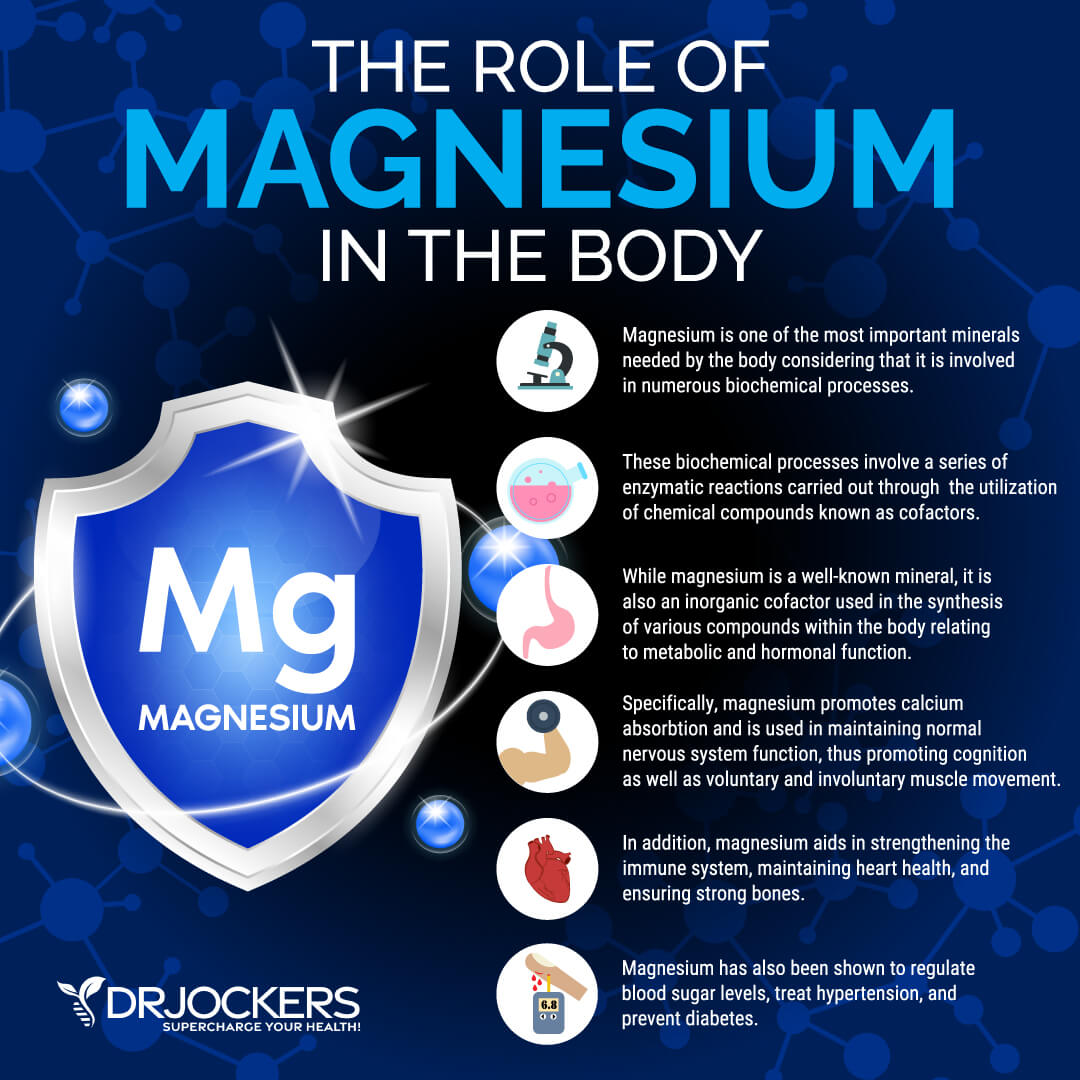
Signs of Magnesium Deficiency May Include (11):
- Muscle cramps and muscle twitches
- Muscle weakness
- Fatigue
- Pain and chronic pain
- Insomnia
- Fibromyalgia
- Low mood, depression, or mental health issues
- Migraines and chronic headaches
- Numbness and tingling
- Osteoporosis
- High blood pressure
- Irregular heartbeat
- Asthma
Magnesium Deficiency May Contribute To (12):
- High blood pressure and cardiovascular disease
- Type 2 diabetes
- Osteoporosis
- Migraines
Risk Factor Conditions For Mag Deficiency (12, 13):
- Gastrointestinal issues
- Kidney problems
- Type 2 diabetes
- Alcohol dependence
- Older adults
- Certain medication
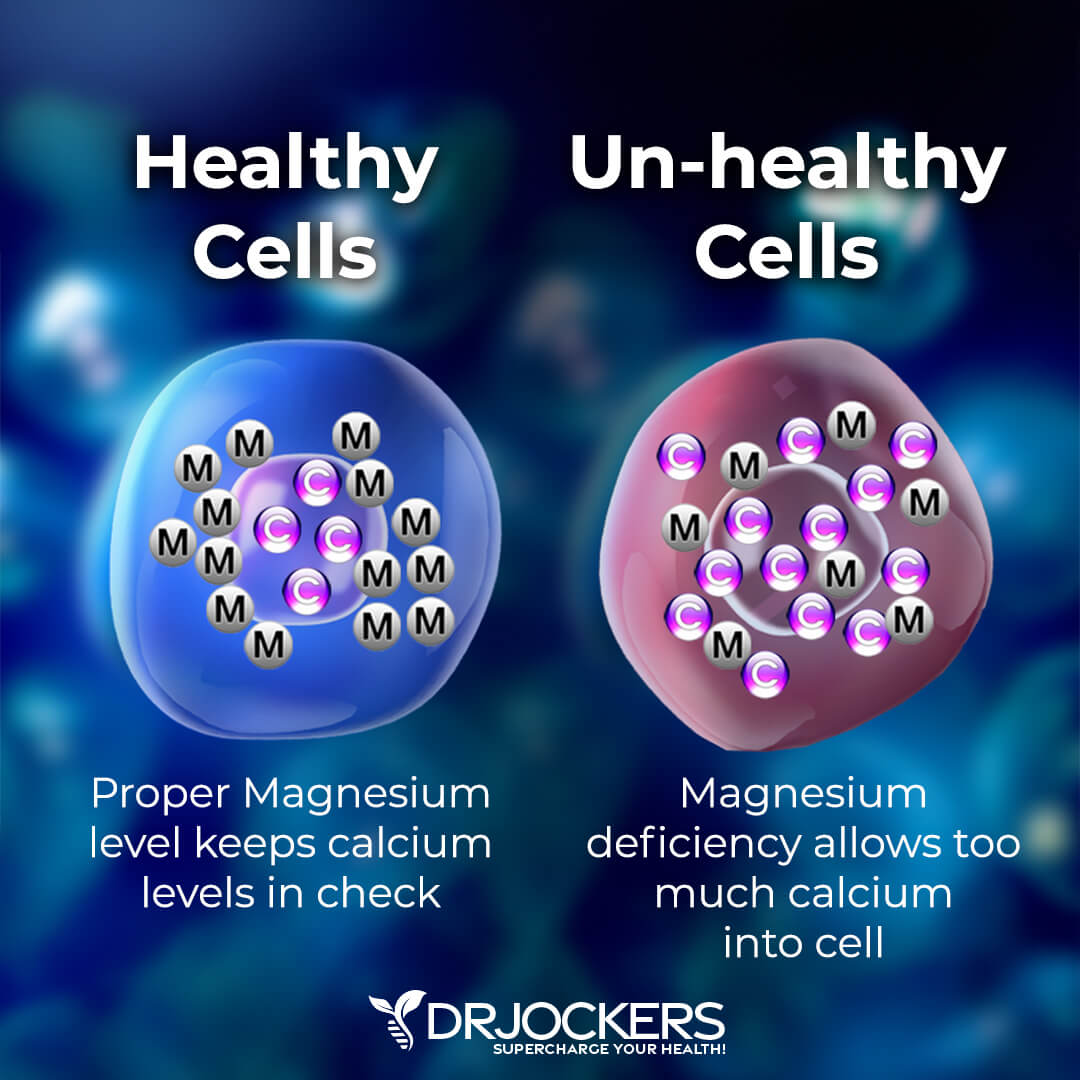
Causes of Magnesium Deficiency
Magnesium deficiency may develop for a variety of reasons. Let’s take a look at some of the top causes of magnesium deficiency.
Inadequate Magnesium Intake
Eating a diet low in magnesium-rich food can easily set you up for magnesium deficiency. However, even if you are eating foods that are naturally rich in magnesium, such as spinach, avocados, almonds, cashews, sunflower seeds, pumpkin seeds, sprouts, beans, legumes, sea vegetables, bananas, cacao, molasses, and Swiss chard, because our soils are depleted, it is difficult to meet your magnesium intake with food alone.
If you are regularly not meeting your daily magnesium requirements through diet and supplementation, it may result in magnesium deficiency and consequent health issues. Supplementing with high-quality magnesium supplements along with eating magnesium-rich foods is the best way to make sure that you meet your body’s magnesium needs. You may learn more about the top magnesium-rich foods in this article.

Diet High in Sugar/Carbs
Eating a diet high in sugar and simple carbohydrates may lead to depleted magnesium levels. Excess sugar intake can lead to elevated insulin and high blood sugar that can decrease your body’s ability to absorb magnesium efficiently. It may also cause your kidneys to excrete magnesium faster than normal.
The problem is that magnesium is essential for stabilizing your insulin and blood sugar levels. When your blood sugar regulation is compromised due to low magnesium, it can lead to a vicious cycle. Cutting down on blood sugar is the best way to regulate your blood sugar levels, allow proper magnesium absorption, and help optimal kidney function.
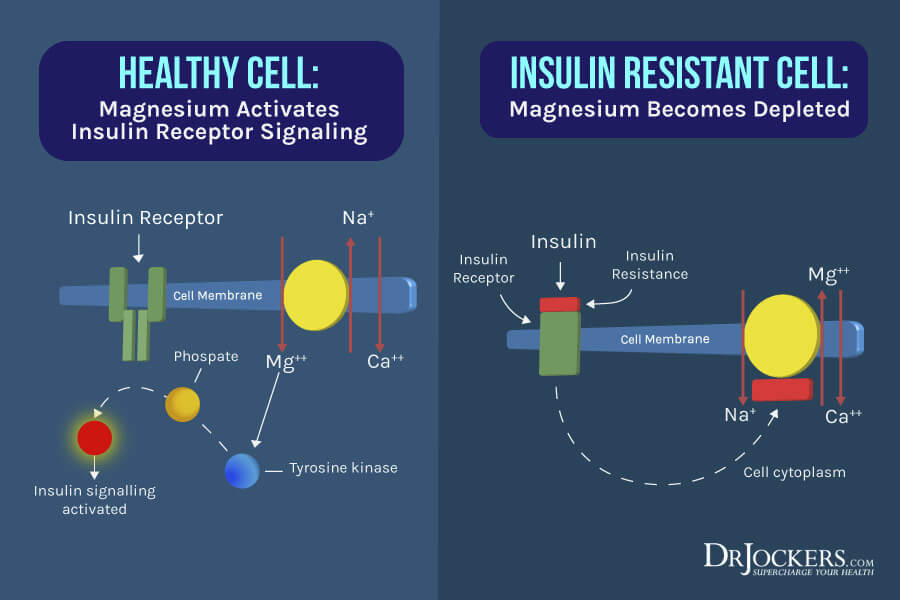
Chronic Stress
Some people call magnesium the anti-stress mineral since it may help to reduce your stress levels, improve your mood, enhance your mental health, and aid sleep and relaxation. However, the relationship between magnesium and stress is a two-way street.
While magnesium can help to reduce symptoms of stress, chronic stress can also deplete your magnesium levels. As a reaction to stress, your body uses up its stored magnesium. Without enough magnesium in the body, your body cannot regulate its stress response and lower symptoms of stress effectively. When addressing magnesium deficiency, it is important to lower your stress levels instead of only focusing on your magnesium intake (14).
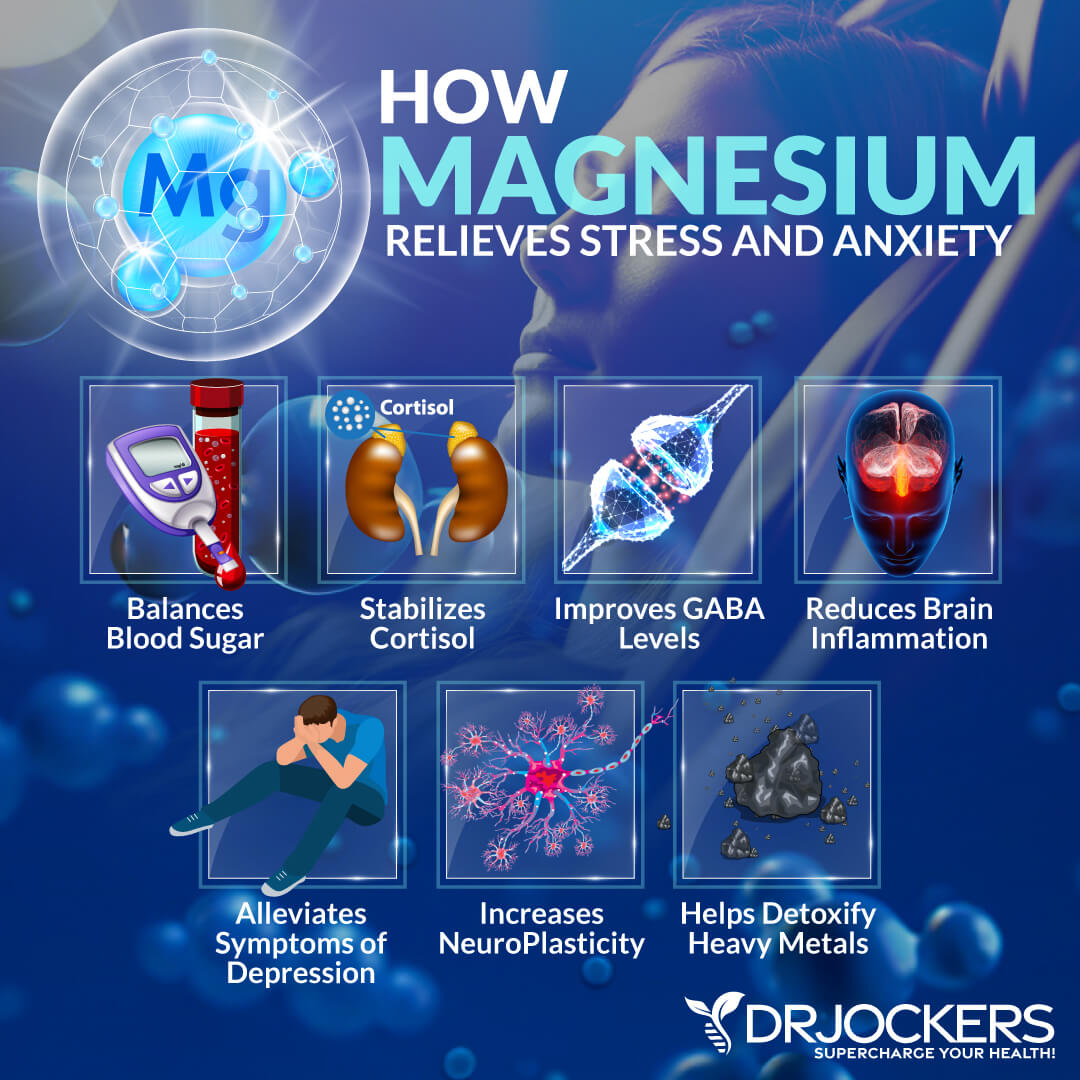
Poor Absorption
It is not enough to consume magnesium-rich foods, your body also needs to be able to absorb them. Poor magnesium absorption can lead to magnesium deficiency even if your intake is otherwise optimal. Low stomach acid and acid reflux are one of the main contributing factors to poor magnesium absorption.
When acid reflux is treated conventionally with anti-acid medication, your stomach acid levels will drop and may lead to even further compromised magnesium absorption. Not surprisingly, the relationship between magnesium and your stomach acid is also two-way.
Magnesium can actually help with acid reflux. It is important that you eat a nutrient-dense diet and support your gut to help to achieve normal stomach acid levels and allow proper magnesium absorption (15).
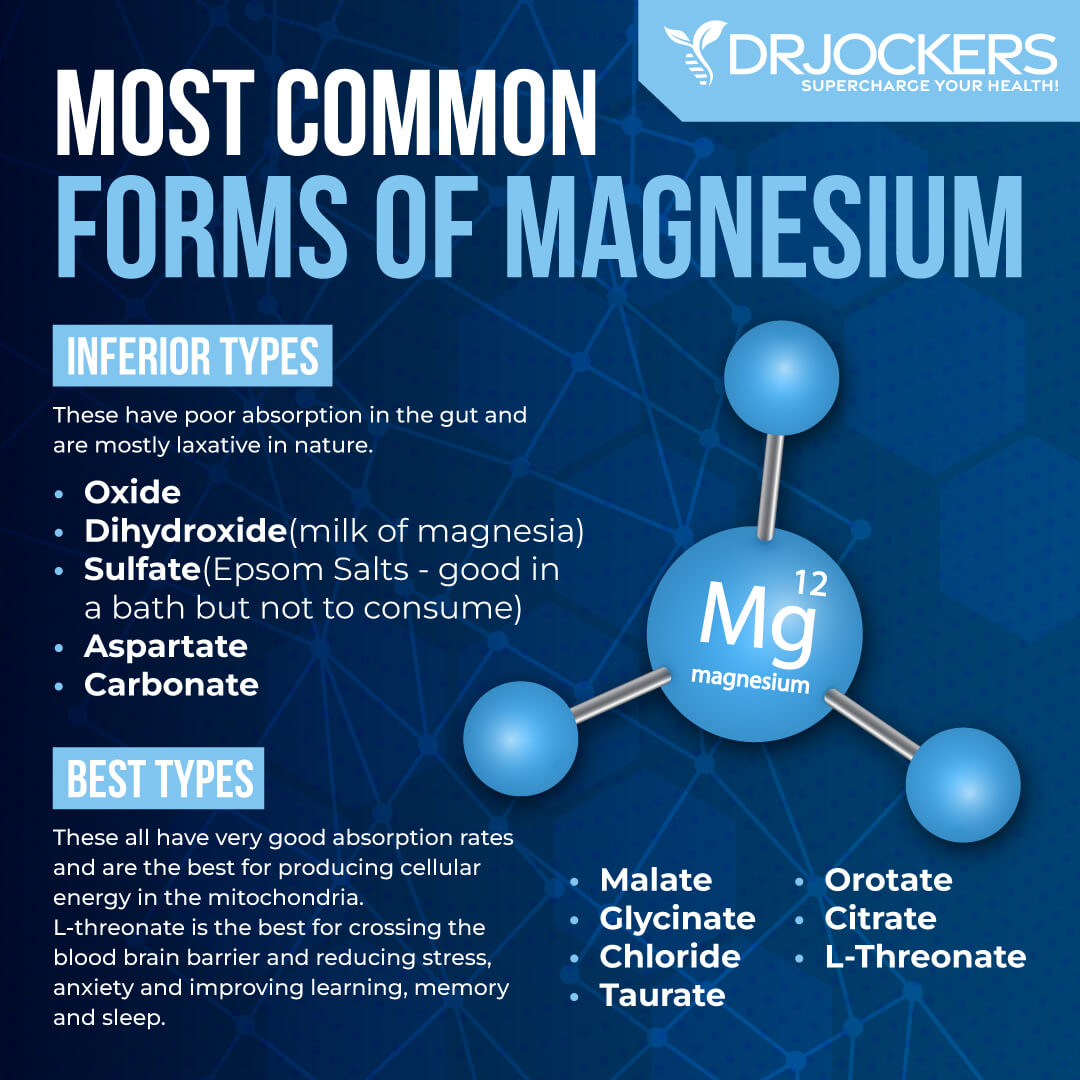
Best Forms of Magnesium
If you are looking for optimal benefits from your magnesium supplement, it is important that you understand the difference between the different forms of magnesium on the market. Different forms of magnesium have different health benefits. You want to find one of the highly absorbable forms for magnesium loading.
Magnesium Citrate
Magnesium citrate is the least expensive and the most commonly taken option. It absorbs in your body easily, however, it also has mild laxative effects and may not be the best if you have loose bowel movements. It may be a good choice if you have constipation and muscle pain.
Magnesium Taurate
Magnesium taurate is one of the best options if you have cardiovascular issues. It absorbs well and doesn’t have laxative effects.
Magnesium Malate
Magnesium malate contains malic acid which is essential for energy production. It is a highly soluble form of magnesium that may be a good option if you have fatigue, muscle pain, and your metabolism.
Magnesium Glycinate
Magnesium glycinate is possibly the safest and best choice for correcting a long-term deficiency, hence it is a fantastic option for magnesium loading that you will learn about soon. It is one of the most bioavailable and absorbable forms. It is the least likely to cause diarrhea. It is great for relaxation and reducing stress.
Magnesium Chloride
Magnesium chloride is a great choice for detoxing your cells and for boosting your metabolism.
Magnesium Carbonate
Magnesium carbonate turns into magnesium chloride in your body when mixed with hydrochloric stomach acid.
Magnesium L-Threonate
Magnesium L-threonate is a fantastic, well-absorbable form of magnesium for your brain health. It is great for depression, anxiety, memory, learning, brain injuries, and neurodegenerative disorders.
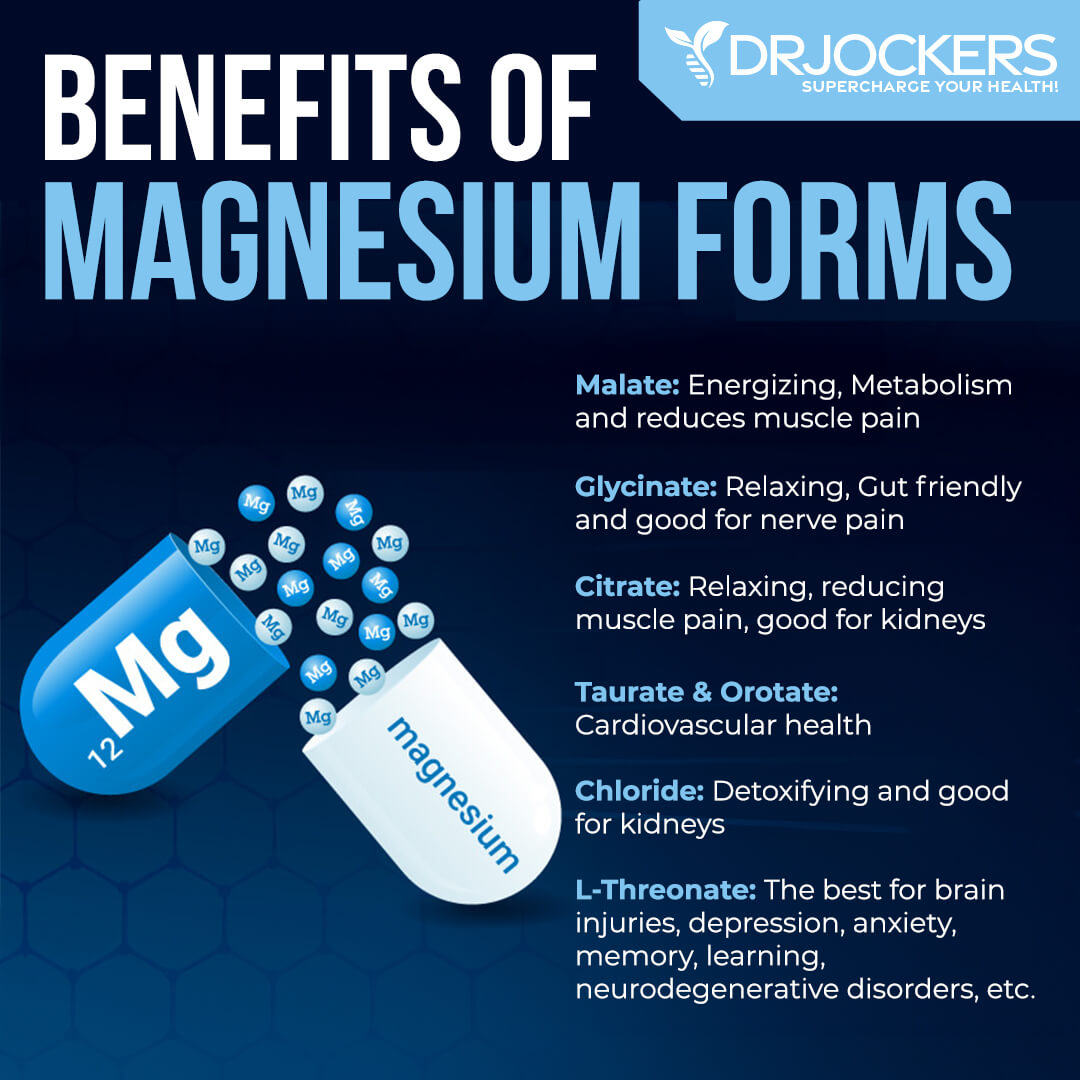
Worst Forms Magnesium
There are several forms of magnesium I never recommend. Here is the list:
Magnesium Oxide
Magnesium oxide is easy to find at pharmacies. However, it is not chelated and absorbs poorly.
Magnesium Sulfate
Magnesium sulfate, or Epsom salt, is excellent for Epsom salt baths. It is often recommended for constipation; however, it is not safe for long-term internal use and it’s easy to overdose.
Magnesium Glutamate and Aspartate
Magnesium glutamate and aspartate are two forms that you need to avoid at all costs. They are the components of aspartame, a toxic artificial sweetener. They are neurotoxic and dangerous to your health.
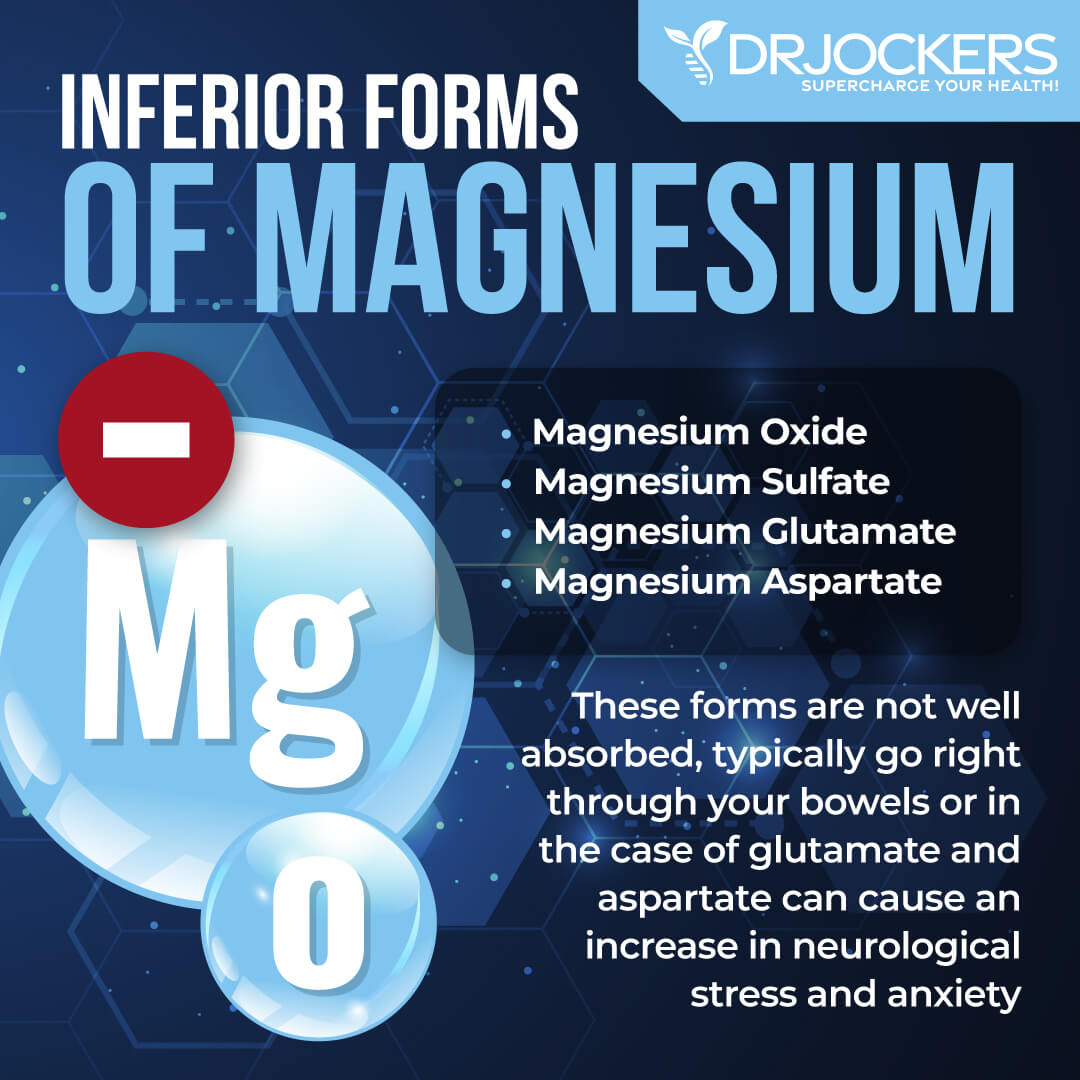
My Recommendation: Brain Calm Magnesium
Looking at these different forms of magnesium supplements, you can see that they each have slightly different effects on your body with slightly different benefits. I believe that it is best to choose a magnesium supplement that provides a well-rounded benefit to support your entire body. This is exactly why I created Brain Calm Magnesium.
Brain Calm Magnesium contains patented magnesium malate, glycinate, and L-threonate forms of magnesium offering maximum neurological and systemic benefits for your body. This supplement is a cost-effective way to boost your magnesium levels, increase your resilience to stress, achieve a more relaxed mental state, reduce muscle and other pain, and improve your overall health.
Brain Calm Magnesium is perfect for magnesium loading that you can read more about in the next section. If you are experiencing muscle pains, you may also try Magnesium Oil Ultra with MSM Topical Spray for topical support.
You may learn more about the best forms of magnesium in this article.
Magnesium Loading Strategy
I believe that most people can benefit from supplementing with magnesium. However, if you are dealing with magnesium deficiency, it is essential that you start supplementing right away. I recommend a magnesium loading strategy to correct current magnesium deficiencies and set yourself up for long-term success. Due to long-term magnesium deficiencies, it will take 60 to 90 days or longer to get fully sufficient in magnesium in your body.
I recommend that you take 1 – 1.5 grams of magnesium daily for magnesium loading. Take 400 mg of magnesium 2-3 times a day or until you reach bowel tolerance. It’s easy to know you have gotten too much magnesium. If you have loose stools shortly after using magnesium, you’ve reached your limit. Decrease your magnesium intake until you see healthy stools again.
Do this for about 2 to 3 months to achieve sufficient magnesium levels. Monitor your symptoms and ask for guidance from your health professional if you are unsure. After 2 to 3 months, lower the dosage to 200 to 400 mg twice a day to keep your levels adequate. To ensure that your body absorbs all the magnesium it receives, make sure to eat an anti-inflammatory, nutrient-dense diet, eliminate or limit your sugar and carb intake, protect your gut, and lower your stress levels.
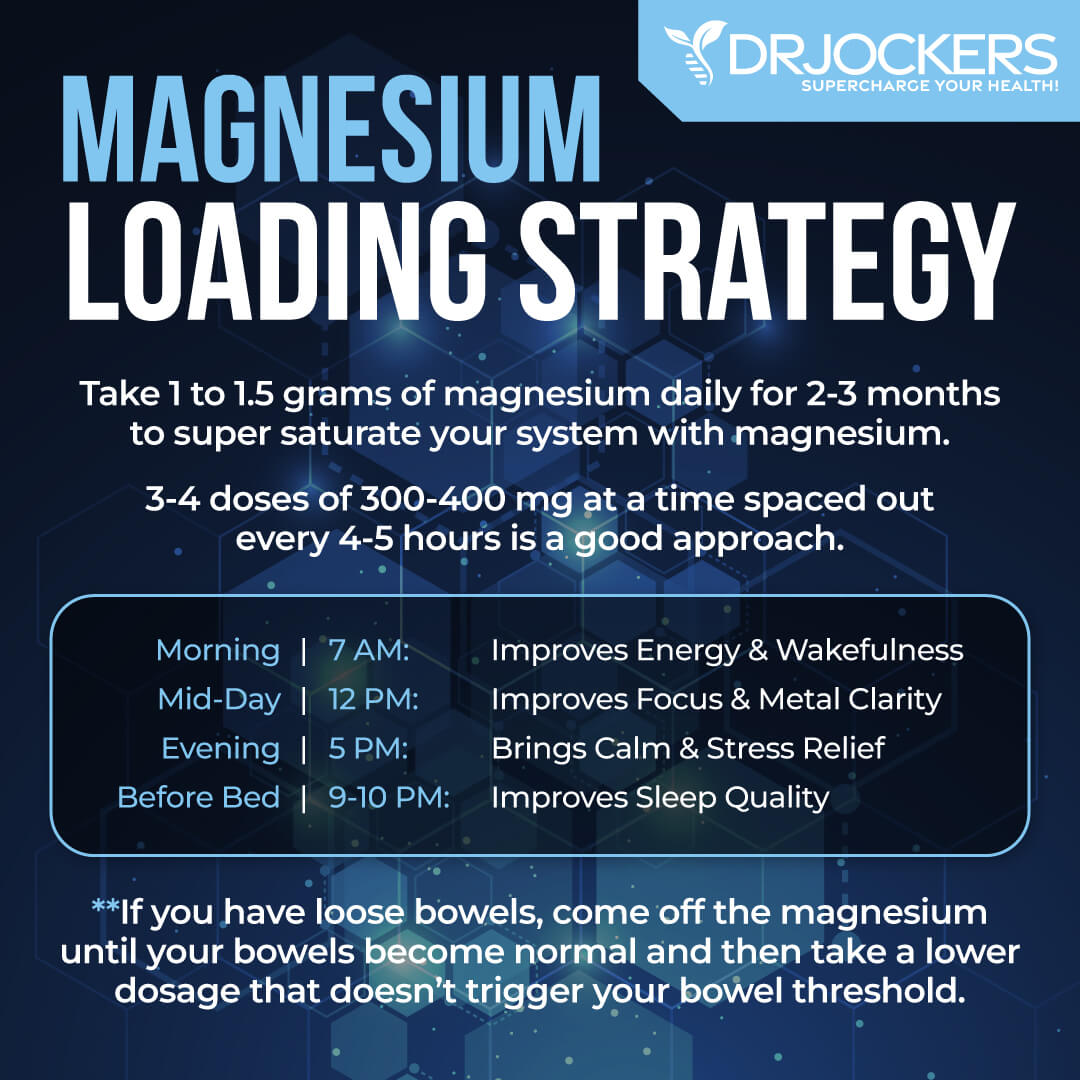
Final Thoughts
Magnesium is possibly the most important nutrients out there that play an essential role in your brain, nervous system, immune system, and cardiovascular health. Magnesium deficiency is incredibly common. It may result in fatigue, muscle pains, chronic pain, migraines, irregular heartbeat, and other health issues.
Follow my magnesium loading strategy to correct magnesium deficiencies, reduce related symptoms, health problems, and health risks, and regain your energy, happiness, and health.





Excellent article on Magnesium however the elemental magnesium for each form of magnesium salt was not specified eg providing 10% magnesium.
Thank you! The elemental will range all over the place but the amino acid carriers are the key for getting it into the system.
Do you not recommend the orotate form? Also, getting enough Mag can cause diarrhea.
What oil forms are recommended? I was taking Magnesium Calm and it worsened my loose bowels. I am very concerned about getting enough good quality Mag w/o bowel issues. Thank you Doctor J.
RJ
Orotate is a good form as well. You can use a magnesium lotion like this: https://store.drjockers.com/products/magnesium-lotion-goodnight-with-melatonin?_pos=3&_sid=5161085c9&_ss=r
Will the brain calm help with cardiovascular issues, lung issues and asthma or would another form of magnesium be better for that?
Yes it will help with these John!
Surprised to read that you say you created that magnesium supplement. You may have changed the name, but it’s been a Xymogen product for years…
Yes we formulated this product with Xymogen.
Hi Dr when you see 1g to 1.5g of magnesium per day does that mean 1g elemental magnesium?
It means chelated magnesium
Thank you for your article on Magnesium. I learned a lot.
I was disappointed to find out that my 200mg magnesium tablet from a high quality brand might not be so high quality! There are 3 types of Magnesium in the tablet:
Magnesium Oxide, Magnesium Citrate and Magnesium gluconate.
Where does the gluconate come from and what is it’s value?
Dear Dr. Jockers,
What do you think of combining magnesium with other minerals ? With a deficiency in both magnesium and iodine every morning I fill a bottle of filtered water with a small teaspoon of magnesium chloride (+/- 2 gram) and 2 drops of Lugol iodine solution and drink that in small portions spread out over the day. Is this an example of 1+1=3, or just the opposite, or does it make no difference to take them together or separate ? In nature (fruits, vegetables) minerals are not often found in isolation but in combination with others. Therefore I think combining should be ok, but I would love to hear your thoughts on this.
Kind regards
Yes this can be very helpful!
Apologizes if overlooking but how would you test for deficiency? E.g. when w/o signs/symptoms, how would interpret a serum level perfectly normal/high but an out-of-norm RBC (too low) and urine (too high) levels? Thank you!
Dr Jockers
Any chance commenting on my question? My guess is that you might just eliminate too much in the urine due to supplementation and likely have a genetic issue with transport enzymes explaining the low RBC value. Is it possible? Do you think citrate is a good form to try?
No, we have found the high dose magnesium really saturates the cells where it matters. Citrate is a good form.
Thank you Dr. Jockers for you reply.
Then I have difficult to understand the normal range in serum, off-range low RBC level and off-range high urine excretion. Been experiment with various form and brands and (high) dosages. Go figure ….
Dr. Jockers, I recently discovered that the supplement that I’ve been taking has three forms of Magnesium; Oxide, Citrate & Aspartate. After reading this article, I now know the aspartate form is not good. I’ve recently started the Biotox will this help detox the bad magnesium??
I’ve found a magnesium blend of only Malate & Taurate to replace the former inferior blend.
Thank you for all the wonderful wealth of information you provide so I can be equipped for optimal health!!!
So glad you are making this switch and getting a better form of magnesium Becky.
I liked the strategy. I’ll apply exactly what is described after watchig your video on youtube.
I believe that there are lots of accumulated calcium in my muscles since I have been consuming calcium rich foods for several years, whereas very very poor magnesium consumption. I have sciatica problems and had been consuming alot of coffee and black tea during the day. It equals to nearly 1000 mg cafein. Now I reduced intake of cafein and calcium and increased intake of magnesium by pumpkin seeds, sparkling water, banana, dark chocolate and mag supplements. I started taking mag oxide pills since 12 days but just changed the form of mags to Malat, taurat, glycinade and citrate. And increased taking pills to 800-900 mg in a day. But still not loose stool. That means my body has been lack of magnesium, maybe for several years. Since yesterday, after 800-900 mg pills in a day (except naturels) I started feeling good, all my muscles started becoming in normal form and I believe sciatica will become free soon.
Great to hear that!
I have been using the CALM Magnesium brand for over a decade to assist with chronic constipation as well as replenish magnesium. I’m 49 and can no longer get the laxative effect that I used to with this product. I have to take 1 Tablespoon (525 g of magnesium carbonate) for about 3 days in a row before it helps in any way with my bowels. I realize now that I’m not taking a good form of Magnesium, but I am wondering how Brain Calm Magnesium would help with my chronic constipation if it doesn’t produce a laxative effect. I look forward to your reply!
Hello Kristen – improving your magnesium status helps improve all your smooth muscle functions and that includes intestinal peristalsis.
I supplemented with large doses of vitamin D three (3) years ago and started getting panic attacks and severe anxiety. Three years after and it’s the same. At first I thought it was caused by COVID. Only recently have I thought that it may have something to do with the vitamin D I took (and kept taking). Could the D have depleted my magnesium?